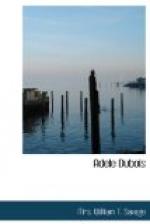Mrs. Dubois stooped to kiss the forehead of her uncle, but started back with a sudden thrill of fear. She gazed searchingly at him for a moment, and then she knew that Death, the conqueror, stood there with her, looking upon his completed work.
After the first shock of surprise was over, she remained gazing upon the spectacle in perfect silence. A truly devout Catholic, in her grief she leaned with all a woman’s trust and confidingness upon the love and power of Christ, and something of the divine calmness which we associate with the character of the mother of our Lord, and which has been so wonderfully depicted to the eye by some of the older painters, pervaded her spirit.
As she thus stood, spellbound, entranced, her eyes fixed upon the noble features irradiated with a smile of content and peace, the long silvery locks parted away from the forehead and flowing around the head, like a halo, she thought it the countenance of a saint, and her poetic fancy created at once a vision of the Saviour, with an aspect grand, glorious, yet gracious and benign, placing with His right hand a golden jewelled crown upon her uncle’s head. A cloud swept up over the gorgeous earthliness of the great Rubens picture, and from out its folds shone sweet and smiling angel faces, looking down upon the scene.
Mrs. Dubois never knew how long she remained thus absorbed. She was first aroused by hearing a voice saying, in tones of fervor, “How blessed it is to die!” And Adele, who had entered the room a little time before, and had uttered these words, stepped forward and imprinted a kiss upon the pale uplifted brow of the sleeper.
CHAPTER XXVI.
POMPEII.
About this period, Mrs. Lansdowne, whose health had been declining for nearly a year, was urgently advised by her physician to seek a milder climate. John immediately offered himself as her compagnon de voyage, and manifested great alacrity in the preparations for their departure for Italy.
After a favorable sea passage, they landed at Civita Vecchia, and, with brief delays at Rome and Naples, went to Sorrento, intending to remain there several months.
This place combines the most striking peculiarities of Italian scenery. It stands on a wide and beautiful plain, shut in by the mountains and the sea. The fertile soil produces oranges, lemons, grapes, and figs of the richest quality and in great abundance. The coast line, a wall of volcanic rock, is broken into varied forms, by the constant action of the waters. Here, they spent day after day, rambling about the old town, making excursions into the neighboring mountains, or crossing the bay to different points of interest. They delighted particularly in sailing under the shadow of the cliffs, watching the varying colors, blue, purple, and green, presented by the glassy surface, peering into the arched caverns, worn into the rock




